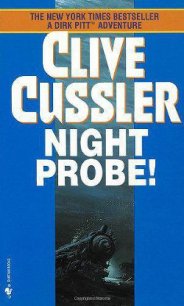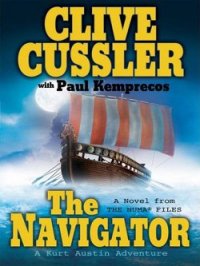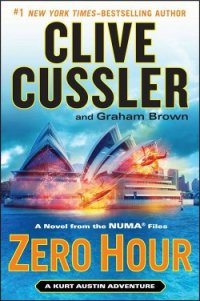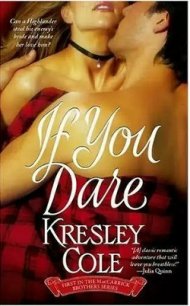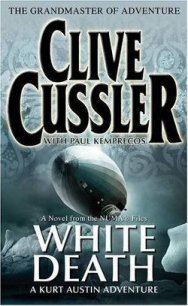Inca Gold - Cussler Clive (читать онлайн полную книгу .TXT) 📗
"Good afternoon," Pitt said pleasantly.
Like most of his people Billy was bilingual, speaking native Montolan among his friends and family and Spanish to outsiders. But he knew a fair amount of English, picked up from his frequent trips over the border to sell his cattle and purchase supplies. "You know you trespass on private Indian land?" he replied stoically.
"No, sorry. I was cast ashore on the Gulf. I'm trying to reach the highway and a telephone."
"You lose your boat?"
"Yes," Pitt acknowledged. "You could say that."
"We have telephone at our meeting house. Glad to take you there."
"I'd be most grateful."
Billy reached down a hand. "My village not far. You can ride on back of my horse."
Pitt hesitated. He definitely preferred mechanical means of transportation. To his way of thinking four wheels were better than four hooves any day. The only useful purpose for horses was as background in Western movies. But he wasn't about to look one with a gift in the mouth. He took Billy's hand and was amazed at the strength displayed by the wiry little man as he hoisted Pitt's 82 kilograms (181 pounds) up behind him without the slightest grunt of exertion.
"By the way, my name is Dirk Pitt."
"Billy Yuma," said the horseman without offering his hand.
They rode in silence for half an hour before cresting a butte overgrown with yucca. They dropped into a small valley with a shallow stream running through it and passed the ruins of a Spanish mission, destroyed by religion-resistant Indians three centuries ago. Crumbling adobe walls and a small graveyard were all that remained. The graves of the old Spaniards near the top of a knoll were long since grown over and forgotten. Lower down were the more recent burials of the townspeople. One tombstone in particular caught Pitt's eye. He slipped to the ground over the rump of the horse and walked over to it.
The carved letters on the weathered stone were distinct and quite readable.
Patty Lou Cutting
2/11/24-2/3/34
The sun be warm and kind to you.
The darkest night
some star shines through.
The dullest morn a radiance brew.
and where dusk comes,
God's hand to you.
"Who was she?" asked Pitt.
Billy Yuma shook his head. "The old ones do not know. They say the grave was made by strangers in the night."
Pitt stood and looked over the sweeping vista of the Sonoran Desert. A light breeze gently caressed the back of his neck. A red-tailed hawk circled the sky, surveying its domain. The land of mountains and sand, jackrabbits, coyotes, and canyons could intimidate as well as inspire. This is the place to die and be buried, he thought. Finally, he turned from Patty Lou's last resting place and waved Yuma on. "I'll walk the rest of the way."
Yuma nodded silently and rode ahead, the hooves of the buckskin kicking up little clouds of dust.
Pitt followed down the hill to a modest farming and ranching community. They traveled along the streambed where three young girls were washing clothes under the shade of a cottonwood tree. They stopped and stared at him with adolescent curiosity. He waved, but they ignored the greeting and, almost solemnly it seemed to Pitt, returned to their wash.
The heart of the Montolo community consisted of several houses and buildings. Some were built from mesquite branches that were coated with mud, one or two from wood, but most were constructed of cement blocks. The only apparent influence of modern living was weathered poles supporting electrical and phone lines, a few battered pickup trucks that looked as if they'd barely escaped a salvage yard crusher, and one satellite dish.
Yuma reined in his horse in front of a small building that was open on three sides. "Our meeting house," he said. "A phone inside. You have to pay."
Pitt smiled, investigated his still soggy wallet, and produced an AT&T card. "No problem."
Yuma nodded and led him into a small office equipped with a wooden table and four folding chairs. The telephone sat on a very thin phone book that was lying on the tile floor.
The operator answered after seventeen rings. "Si, por favor?"
"I wish to make a credit card call."
"Yes, sir, your card number and the number you're calling," the operator replied in fluent English.
"At least my day hasn't been all bad," Pitt sighed at hearing an understanding voice.
The Mexican operator connected him to an American operator. She transferred him to information to obtain the number for the Customs offices in Calexico and then put his call through. A male voice answered.
"Customs Service, how can I help you?"
"I'm trying to reach Albert Giordino of the National Underwater and Marine Agency."
"One moment, I'll transfer you. He's in Agent Starger's office."
Two clicks and a voice that seemed to come from a basement said, "Starger here."
"This is Dirk Pitt. Is Al Giordino handy?"
"Pitt, is that you?" Curtis Starger said incredulously. "Where have you been? We've been going through hell trying to get the Mexican navy to search for you."
"Don't bother, their local commandant was probably bought off by the Zolars."
"One moment. Giordino is standing right here. I'll put him on an extension."
"Al," said Pitt, "are you there?"
"Good to hear your voice, pal. I take it something went wrong."
In a nutshell, our friends from Peru have Loren and Rudi. I helped the crew escape on a life raft. I managed to swim to shore. I'm calling from an Indian village in the desert north of San Felipe and about thirty kilometers west of where the Alhambra lies half-sunk in the muck."
"I'll dispatch one of our helicopters," said Starger. "I'll need the name of the village for the pilot."
Pitt turned to Billy Yuma. "What do you call your community?"
Yuma nodded. "Canyon Ometepec."
Pitt repeated the name, gave a more in-depth report on the events of the last eighteen hours and hung up. "My friends are coming after me," he said to Yuma.
"By car?"
"Helicopter."
"You be an important man?"
Pitt laughed. "No more than the mayor of your village."
"No mayor. Our elders meet and talk on tribal business."
Two men walked past, leading a burro that was buried under a load of manzanita limbs. The men and Yuma merely exchanged brief stares. There were no salutations, no smiles.
"You look tired and thirsty," said Yuma to Pitt. "Come to my house. My wife make you something to eat while you wait for friends."
It was the best offer Pitt had all day and he gratefully accepted.
Billy Yuma's wife, Polly, was a large woman who carried her weight better than any man. Her face was round and wrinkled with enormous dark brown eyes. Despite being middle aged, her hair was as black as raven's feathers. She hustled around a wood stove that sat under a ramada next to their cement brick house. The Indians of the Southwest deserts preferred the shade and openness of a ramada for their kitchen and dining areas to the confining and draftless interior of their houses. Pitt noticed that the ramada's roof was constructed from the skeletal ribs of the saguaro cactus tree and was supported by mesquite poles surrounded by a wall of standing barbed ocotillo stems.
